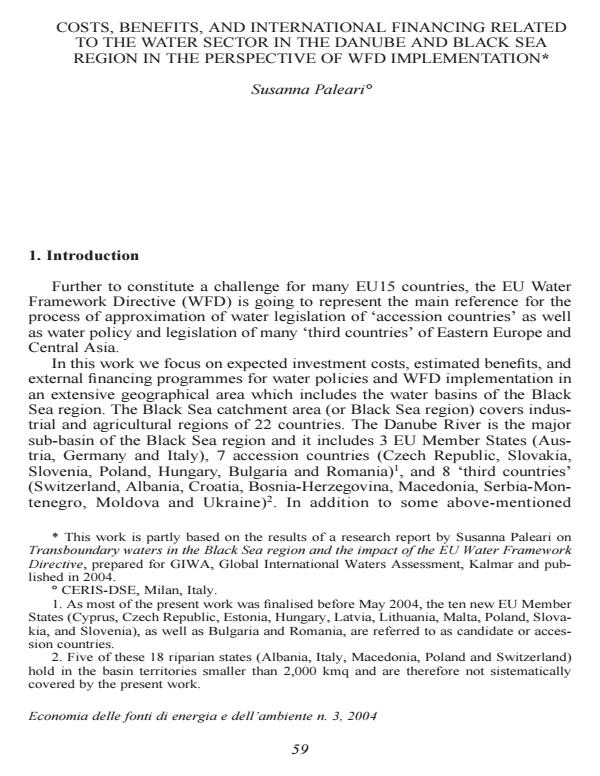Costs, benefits, and international financing related to the water sector in the Danube and Black Sea region in the perspective of WFD imlplementation
Journal title ECONOMIA DELLE FONTI DI ENERGIA E DELL’AMBIENTE
Author/s Susanna Paleari
Publishing Year 2006 Issue 2004/3
Language English Pages 35 P. File size 136 KB
DOI
DOI is like a bar code for intellectual property: to have more infomation
click here
Below, you can see the article first page
If you want to buy this article in PDF format, you can do it, following the instructions to buy download credits

FrancoAngeli is member of Publishers International Linking Association, Inc (PILA), a not-for-profit association which run the CrossRef service enabling links to and from online scholarly content.
<i> Costs, benefits, and international financing related to the water sector in the Danube and Black Sea region in the perspective of WFD implementation </i> (by Susanna Paleari) - ABSTRACT: Further to constitute a challenge for many EU15 countries, the EU Water Framework Directive (WFD) is going to represent the main reference for the process of approximation of water legislation of ‘accession countries’, as well as water policy and legislation of many ‘third countries’ of Eastern Europe and Central Asia. In this work we focus on expected investment costs, estimated benefits, and external financing programmes for water policies and WFD implementation in an extensive geographical area, the Black Sea region, which includes the Danube Basin (that is the second largest European water basin after the Volga Basin) and covers industrial and agricultural areas of 22 countries. As we are primarily interested in the economic aspects of water policies and the WFD implementation in the above geographical area, we will develop a joint analysis of: (a) the available estimates on the size of investments in the water sector required to approximate the provisions and/or (depending on single countries) the principles of WFD; (b) the available estimates on the expected benefits from implementing EU water legislation and the WFD; (c) the flows of international assistance and financial resources available during the next few years for investing in water-sector infrastructures and management in the countries of the Black Sea region. The approximation of EU water legislation and the implementation of the WFD will entail huge investment costs by accession countries during the next decades and water is expected be the most significant area of investment within the environmental sector in the majority of these countries. The attempts to estimate economic and environmental benefits indicate that the same process of compliance with EU legislation and the WFD will produce significant benefits for the economy and the environment of these countries. During the last part of the 1990s, however, the trends of actual expenses in environmental and water infrastructures in the countries of the Black Sea region as a whole have been lower than the estimated level required for the implementation of water legislation and the WFD. For this reason, international financial assistance and economic resource transfers to these countries, in the framework of EU enlargement and European integration, can have a key role in boosting investments in the water sector towards approximation to the EU water legislation. The extension and the overall financial endowment of the complex network of the existing water programmes and initiatives is impressive and seems to be great enough to establish an upward, sustained trend of water-related investments in the countries considered, thus bringing to a good process of approximation to EU standards.
Susanna Paleari, Costs, benefits, and international financing related to the water sector in the Danube and Black Sea region in the perspective of WFD imlplementation in "ECONOMIA DELLE FONTI DI ENERGIA E DELL’AMBIENTE" 3/2004, pp , DOI: